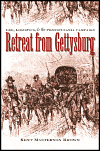 The attorneys are transforming this field. Here comes another one, Kent Masterson Brown (right).
The attorneys are transforming this field. Here comes another one, Kent Masterson Brown (right). David Perry, editor at the University of North Carolina Press, said "a surprising number of really good books on the Civil War have been written by attorneys." "I don't know if it's because they were history buffs before they went to law school and it's something they needed to get out of their systems," Perry said. Perhaps, "it's the thoroughness of their research, but they're also used to storytelling and they narrate really well. And they also argue really well."So says this article profiling Brown.
Brown has published a strong and unusual argument in Retreat From Gettysburg: Lee, Logistics and the Pennsylvania Campaign.
The usual post-battle discussion centers around whether or not Meade's follow-up was adequate. Brown seems to give Meade his due while spotlighting Lee's retreat as of such quality as to have delivered a major strategic victory.
Point one: "Too many Civil War writers talk only in terms of battlefields, as though this is checkers on a checkerboard and you can move them any way you want." Amen.
Point two: "And while many have called Gettysburg the 'turning point of the war,' Brown disputes that assertion. 'It was a big, bloody battle which Lee lost, but it didn't turn anything,' Brown said."
Point three: "In Retreat, Brown argues that Robert E. Lee secured strategic victory from a tactical defeat at Gettysburg ... By amassing cattle, sheep, hogs, coal, forges and other supplies from the Pennsylvania countryside, Lee was able to replenish his army, restore the balance of power, and continue the war for another two years." That's where the backbone of the case is going to be made.
 Gary Gallagher, a writer who has done much to uphold 50 years of conventional wisdom in Civil War history, seems swayed by Brown's study: "He's managed to go into an extremely crowded field and find a topic that hasn't been treated adequately, and then do a first-rate job on it."
Gary Gallagher, a writer who has done much to uphold 50 years of conventional wisdom in Civil War history, seems swayed by Brown's study: "He's managed to go into an extremely crowded field and find a topic that hasn't been treated adequately, and then do a first-rate job on it."This is hugely important:
Published in the spring, Retreat has sold 5,000 copies in three months, making it the top seller of the 80 books that University of North Carolina Press printed in its just-completed fiscal year.Broadcast that message - revisionism pays - and this broken field of study may yet be mended.



